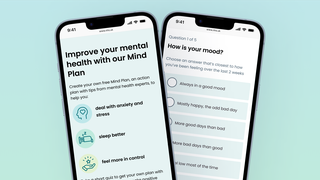Dealing with stress
Stress is something everyone feels at times, especially when dealing with change or life challenges, such as money worries, work issues or relationship problems.
A little stress can be a good thing, as it helps us to get things done or focus on something that needs our attention.
How we manage stress can make a big difference to our mental wellbeing, and the first step to managing it is to know how it affects us and why.
Find out about common symptoms of stress and possible causes. Plus get advice on stress relief, and a personalised plan of self-care tips.
What is stress?
Stress is the body's reaction to feeling threatened or under pressure.
When we are stressed, our body releases a hormone called adrenaline (often called the "fight or flight" hormone), which usually gives us a boost or motivates us to act quickly.
But too much stress can affect our mood, our body and our relationships – especially when it feels out of our control. It can make us feel anxious and irritable, and affect our self-esteem.
Experiencing long-term stress or severe stress can lead to feeling physical, mental and emotional exhaustion, often called "burnout"
Signs and symptoms of stress
Stress can affect our emotions and we may:
- be irritable, angry or tearful
- feel worried, anxious, hopeless or scared
- struggle to make decisions, have racing thoughts or feel overwhelmed
The physical symptoms of stress include:
- stomach problems, stress headaches and other odd pains including muscle pain
- skin reactions, like stress rashes and hives
- feeling dizzy, sick or faint
Sometimes, stress causes high blood pressure and chest pains – but these symptoms should stop when your stress goes. If you have any symptoms that you are worried about, or feel you have more severe stress, see a GP.
Stress can also make us behave differently, especially around:
- how much we eat or exercise
- our habits around drinking, smoking or taking other substances
- how much we see people or do things we used to do or enjoy (avoidance)

What causes stress?
The things that cause stress vary from person to person.
The level of stress you are comfortable with may be higher or lower than that of others around you. Stressful feelings typically happen when we feel we do not have the resources to manage the challenges we face.
Pressure at work, school or home, illness, or difficult or sudden life events can all lead to stress.
Possible causes of stress include:
- our genes, upbringing and experiences as children or adults
- personal problems like relationship issues
- life changes, like moving house, having a baby or bereavement
- money worries, housing issues or job problems
- health issues, either for you or someone close to you
- pregnancy and parenting
- loneliness or feeling unsupported
Find out more about life's challenges that might cause stress and how to deal with them.
Tips on managing stress
Try these practical self-care tips, as they might make a big difference.
Try self-help techniques
Our short videos and practical guides to cognitive behavioural therapy (CBT) can help you deal with stress by working through problems in new ways and building resilience. Try our self-help CBT techniques

Try positive thinking
Positive thinking can help with stress relief, so take time to think about the good things in your life. Each day, list 3 things you're thankful for, however small.

Talk to someone
Trusted friends, family and colleagues, or contacting a helpline, can help us when we are struggling. Check out our video on social connection.

Split up big tasks
You might feel less stressed if you can take practical steps, such as breaking a task down into easier, more manageable chunks. And give yourself credit when you finish a task.

Be more active
Being active regularly can help you to burn off nervous energy, so it could be a way for you to deal with stress. Exercise might also help you manage or reduce stress. Try our Better Health: Home workout videos.

Plan ahead
Planning ahead for upcoming stressful days or events – creating a to-do list, planning your journey and listing things you need to take – can really help to relieve stress.
Video: Breathe through stress
Erin fits short breathing exercises into her daily routine to manage stress and anxiety. No matter what you are doing, pausing for a few minutes to breathe can help you feel calmer.
Find what works for you

Create your own free Mind Plan
Answer 5 quick questions to get your plan with practical tips to help you deal with stress and anxiety, improve your sleep and feel more in control.
Video: Expert advice on dealing with stress
Professor Anna Whittaker, psychologist and professor of behavioural medicine, says: "Taking control of the situation when you're feeling stressed is really empowering."
More help and support for stress
-
NHS advice and support
If stress is affecting your daily life, contact NHS 111 or talk to a GP.
If you live in England, you can refer yourself for free NHS talking therapies without seeing a GP.
-
Charities, helplines and communities
These organisations offer help and support:
- Samaritans has a 24-hour help line, open every day of the year
- Time to Change also has personal stories on its website
- Mental Health Foundation: Stress
- Stress Management Society
-
Books on mental health and wellbeing
Check out Reading Well's list of books on mental health.
The books, which should be available for free from your local library, cover topics including meditation, mindfulness and other mental health topics.
Helping someone else
Get tips and advice on helping others struggling with their mental health.
Urgent support
If you cannot wait to see a doctor and feel unable to cope or keep yourself safe, it's important to get support.
Help us improve this page!
Was this content helpful? Answer a few quick questions to help us make it better.